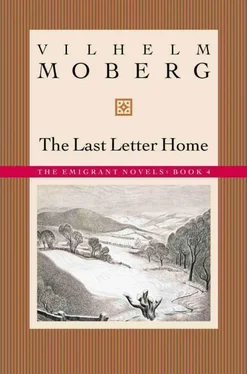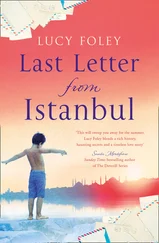He continued on a road through a clearing to the sheep meadow, but first he had to climb two fences, which he did very easily by placing his hands on the top rail and swinging over it in one leap. It was fun to jump fences and stiles that way, but it was no sport for lame, aching old farmers.
Near the stile was the rabbit run, the finest in the village; he was always sure to get a rabbit there. On clear mornings in the fall, after the first frost-glitter on the grass, he would stand at this stile with his gun, waiting. He could hear the dogs pursuing the rabbit across yellow fields and through the underbrush until the sound echoed against the cliffs. This was the wonderful morning song of the forest, the sound of adventure to the boy, who stood motionless, tense, waiting for the rabbit to come along the fence toward the stile. He held the gun cock with his thumb — in a moment it would happen! The gossamer over bushes and branches glittered in the sun and the ground smelled of healthy autumn frost.
The boy had discovered the rabbit run at the stile by himself. And now the old man sought for it on the map and found it, and many other places that belonged to the time when he moved easily on the earth. His finger on the map was sure to find them.
There was Åkerby Junction, on the county road, where boys and girls met on Saturday evenings and danced under the open sky, and where those not yet men or women fumbled for each other in childish shyness. There were the crossroads, shortcuts, hidden, narrow paths where youth sought its way, and where he once had swung himself over gates and stiles. And of everything he had rediscovered on his village map he could say: Here I was rich and well pleased with my life. Of what use are my poor days now?
Charles O. Nelson adjusted the pillow behind his head. The auger of pain gnawed and dug into his back. An hour of pain had passed while he thumbed the old map. It was not a violent pain he suffered, but it was persistent, it never left him, it stayed where it once had lodged itself. On this he could rely: It would stay with him, for sure, as long as he lived.
But it was no danger to life: He would not die from his backache. Some people took a long time to die. Their strength ebbed but not their life. They kept on dying, day after day, through many years. They became useless, and lived to no one’s joy, least of all their own. But they were not allowed to die. They died stubbornly, through the long years, with plenty of time to stroll through old places.
A person ought to die when he becomes useless and not worthwhile any longer.
The old farmer folded the map and put it aside. He looked out through the window, up toward the sky, wondering if the good harvest weather would last. They had grown fine wheat this year, tall, heavy sheaves, shocked out there as far as his eyes could see. Now if they could only get it in all right.
Sometimes heavy rains fell in Minnesota this time of year. Once it had rained so violently that half his crop washed away.
Now he saw that the sky was cloud-free as far as he could see from this side of the house, and perhaps the dry weather would hold. But everything changed so quickly in America, here no signs were to be relied on. When the sunset was clear in Sweden you could count on fine weather the following day, and when the sun set in a cloudbank you were sure of rain. But that didn’t hold true here, perhaps because America was on the other side of the globe.
With his eyes and ears he followed as much as he could of what happened outside. As far as he was able to, the old one took part in the young people’s life.
He saw his sons leave the field and go into their house; he raised his head and looked after them. The Irish wench usually had coffee and sandwiches for the boys about this time in the afternoon. But he couldn’t see the grandchildren, they had left the garden; now he heard them down at the lake, where they were playing and carrying on.
He tried to keep track of those brats, for some reason; he wanted to know where they were and what they were doing. If he didn’t hear their howling or shouts for a while he began to worry.
The auger kept drilling, today his ache didn’t give up for a second. Today he certainly received his full pay, his reward for toil and struggle. This was his pay for clearing forty acres of land in America. And much was still due him, many days’ pay; he didn’t doubt he would be paid in full.
But then again there would be days when he didn’t feel it, and those were good days. As yet he could take care of himself, he required no help. He cooked his own food and washed his own dishes and kept his room clean. His daughter-in-law helped him with the laundry and the worst scrubbing, and the grandchildren ran errands if he needed anything. And occasionally an old neighbor dropped in; such changes were good. He didn’t do much visiting himself, hardly ever left the Nelson Settlement. It was now several years since he had gone as far as St. Paul. But he remembered well that last time, for he had been with Harald and they had seen a panorama in a tent outside Fort Snelling for twenty-five cents. It was perhaps the most remarkable thing he had seen in all his life.
The panorama was painted on long sheets of sailcloth, ten feet tall, and a man explained what the pictures meant. There was a battlefield of the Civil War — bloody bodies all cut in pieces, fallen soldiers lying across each other, long rows of corpses piled like firewood. It made him feel as if the war itself was in his throat, he had a nauseating taste of blood as he looked at those pictures.
They had also been shown how the Southern rebels had tortured their prisoners: They pushed the Union flag into the mouth of the Northerners: Men who fought for the Union ought to be made to swallow their flag! If the victims choked or lost consciousness, cold water was poured over them to revive them.
The panorama was remarkable, yet repulsive.
If Old Abe had lived and remained in the presidential chair he would surely have forbidden fools to travel about and show such bloody, cruel pictures. The settlers’ own President meant the South and the North to be friends again as soon as the war was over, to live as brothers in the Union. Those who raked up the old dried-up blood from the battlefields and put it on sailcloth to show for money, such people were fostering new hatred. Jesters who made money from spilled blood ought to be flogged thoroughly. They weren’t any better than grave robbers. But people did exist who would sell human flesh if they could gain a quarter by it.
There was also another panorama that he liked better: The Mississippi River was shown in its full length on the sailcloth, from the falls at St. Anthony, now called Minneapolis, all the way to the Mexican Gulf. A clever painter had traveled on a raft all the distance to New Orleans and while he floated along he had depicted the beautiful shores on a roll of sailcloth, and here in the panorama tent one could see the great water in all its majesty. Looking at it was exactly like traveling on this river through the heart of America.
The old man would never make that journey in reality, indeed, he might never make any more journeys; not even to St. Paul, if another panorama should come again, it was too difficult for him to move about.
The old settler moved again in his bed, sought a place for his back where the auger might ease its work a little. Sometimes it was better when he stretched out on his back, other times on his left or right side. He never knew in which position he could best escape that torture tool.
But today he could find no escape, no comfortable position. And that was why he picked up the map, to wander those paths he never more would see, to return to the places of his past.
He had once moved from one continent to another. He had once been Karl Oskar Nilsson, at New Duvemåla. How many years ago was that? Now he was the old man at the Nelson Settlement, and only one last move remained for him — from one world to another.
Читать дальше












